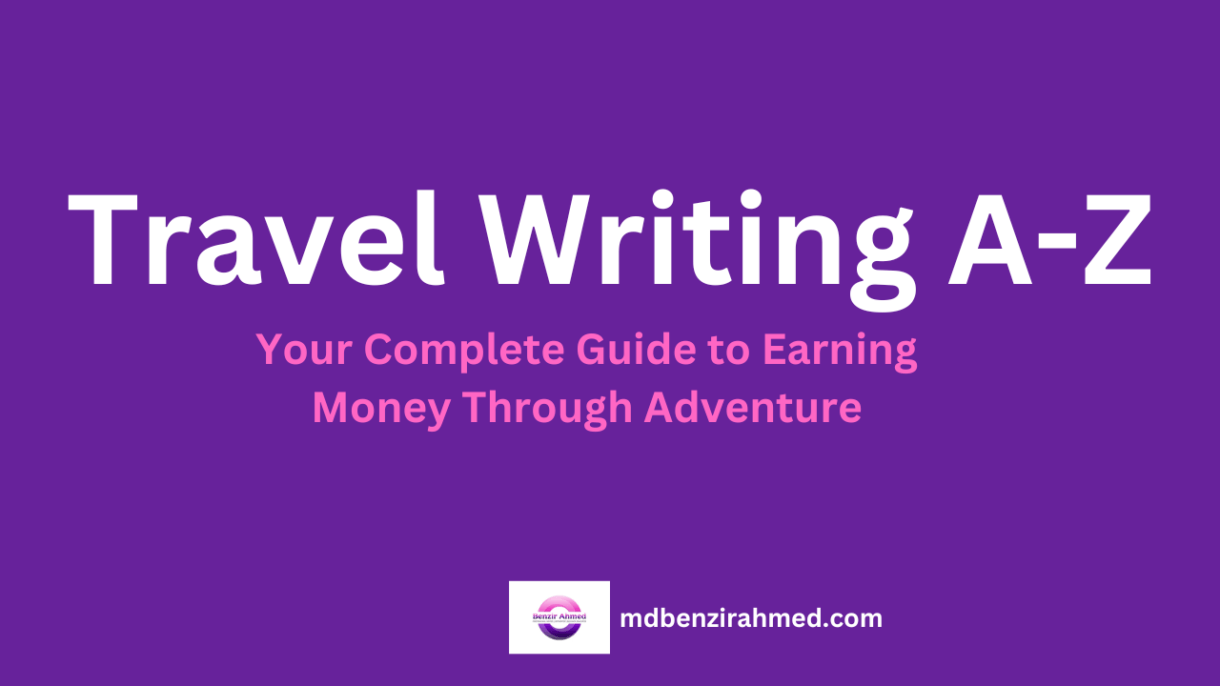Imagine getting paid to travel the world, experiencing new cultures, and documenting your adventures. Travel writing offers an incredible opportunity to turn your wanderlust into a career that pays, but it’s more than just jotting down memories from your latest vacation. As someone passionate about travel and like to explore the world of travel writing, I, Benzir Ahmed, am on a journey to gather knowledge and help others succeed in this field. On my blog, mdbenzirahmed.com, I explore various writing niches, and this article marks my first deep dive into the travel writing niche. Whether you want to blog, freelance, or publish your stories in significant travel magazines, this guide will help you understand how to get started and make money as a travel writer.
What is Travel Writing?
Travel writing can include everything from blogging and freelance writing to publishing books and contributing to travel publications. It’s not just about sharing your travel experiences; it’s about creating content that inspires, informs, and entertains readers by showcasing destinations, cultures, and unique experiences.
While I’m exploring this niche myself, I’ve found that travel writing offers endless possibilities, from writing for personal blogs to getting published in leading travel magazines. However, the key to success lies in understanding the field and mastering the necessary skills, such as SEO, storytelling, and marketing.
My goal here is to guide aspiring travel writers through the essential steps to thrive in this competitive yet rewarding niche.
What Qualifications Do You Need to Become a Travel Writer?
Through my research, I’ve come to understand that while travel writing doesn’t have strict educational requirements, specific skills can give you a significant advantage. Here’s what I’ve found to be most important:
- Strong Writing Skills: Being able to craft compelling stories is the cornerstone of travel writing. Even though I’m still developing my writing style in this niche, I know that vivid descriptions and an engaging narrative are crucial for keeping readers hooked.
- Photography: Good travel writing is often complemented by strong visuals. Having basic photography skills will make your work more appealing. I’m currently learning the basics myself and have found that this skill is a great asset.
- SEO Knowledge: Search Engine Optimization (SEO) is the key for getting your content noticed online. From my experience researching various writing niches, I’ve learned how important it is to use the right keywords to boost visibility. Travel writing is no different, and I’m continually working to improve my SEO knowledge.
- Social Media Savvy: Building an audience is essential, and platforms like Instagram and Pinterest are fantastic tools for promoting travel content. While I haven’t fully delved into social media for travel writing yet, I’m learning how powerful these platforms can be for reaching new readers.
- Networking and Communication: Travel writing often involves pitching your ideas to editors or working with tourism boards. Effective communication is key, and developing relationships within the industry can open doors to more opportunities.
As I continue to develop my skills, these qualifications have become clear markers for success in travel writing.
How to Get Started as a Travel Writer
Here are the steps I’ve found to be most effective for anyone looking to enter the travel writing field, including myself:
1. Start a Travel Blog
Creating a blog is one of the best ways to break into travel writing. It allows you to showcase your writing, build a portfolio, and attract an audience. On mdbenzirahmed.com, I write about various writing niches to help aspiring writers to succeed. Travel writing is one of the many niches I explore, and this article marks my first focused effort to guide writers in this field.
When you start your travel blog, you should choose a particular field of travel writing to focus on, such as:
- Adventure Travel
- Budget Travel
- Eco-Tourism
- Solo Travel
- Family Travel
Selecting a niche can help you to a great extent to stand out in a crowded field and attract a targeted readership. If you’re thinking of starting a blog, remember to optimize your posts for SEO using keywords like travel blog writing tips and adventure travel. I’m also learning how affiliate marketing can help monetize a blog naturally. I’ve found that recommending services such as Booking.com or Amazon for travel gear is a great way to generate passive income.
2. Build a Portfolio
Your portfolio is important for landing paid gigs. While I’m still working on mine, I’ve learned that contributing guest posts to travel blogs or magazines helps to build credibility. Start by submitting your best travel stories to publications, even if they don’t pay much at first. Over time, your portfolio will reflect your expertise, and you’ll be able to command higher fees.
Freelance platforms like The Write Life and WaveApps are great places to look for beginner freelance travel writing gigs.
3. Get Paid for Travel Writing
Based on my research and understanding of different writing niches, there are several ways travel writers earn money. Here’s what I’ve learned:
Income Sources for Travel Writers
a. Freelance Travel Writing
Freelance travel writing offers flexibility. Though I haven’t personally pursued this path yet, I’ve found that platforms like Upwork, Freelancer, and Fiverr are ideal for finding travel writing jobs. Depending on the publication, freelance writers can earn anywhere from $0.10 per word to over $1 per word for top-tier publications.
b. Travel Blogging
Monetizing your travel blog takes time but can lead to long-term income possibilites. I’m learning about the benefits of affiliate marketing, sponsored posts, and display ads. Travel bloggers often partner with affiliate programs such as Amazon Associates or Booking.com to recommend services and products. For example, you could include links to essential travel gear from Amazon within your blog posts, which provides a source of passive income.
c. Sponsored Content
When your blog or social media following grows companies may approach you for sponsored posts or paid trips. Brands like Airbnb often collaborate with travel writers to promote their services. Sponsored content can offer the chance to travel for free while getting paid to write about the experience.
d. Publishing eBooks and Travel Guides
If you have a wealth of travel knowledge, writing and self-publishing travel guides or eBooks is another way to earn income. Although I’m still researching this option, platforms like Amazon Kindle Direct Publishing (KDP) make it easy to sell your travel books directly to readers.
e. Affiliate Marketing
Affiliate marketing is one of the simplest ways for travel writers to generate passive money. This involves adding affiliate links within your travel stories to products or services you recommend. Programs like the Airbnb Affiliate Program or Amazon Associates offer commissions when readers click through and make purchases.
e. Advertising Revenue
Once you’ve built a large following, applying to advertising networks like Google AdSense or Mediavine can provide additional income through display ads. Advertising revenue grows with consistent traffic and can become a significant stream of income.
How Much Can You Earn as a Travel Writer?
Earnings in travel writing vary largely based on experience, niche, and the types of income streams you pursue. Through my research, I’ve found that freelance writers typically earn between $100 to $500 per article. Established bloggers with a significant following can earn thousands of dollars per month through a combination of affiliate marketing, sponsored posts, and advertising.
Here’s a breakdown of possible income streams:
- Travel Blogging: $1,000 to $10,000+ per month (through ads, affiliates, and sponsorships)
- Freelance Articles: $100 to $1,000 per article
- Sponsored Posts: $200 to $1,500 per post
- Affiliate Income: $500 to $5,000+ per month
- eBook Sales: $1,000 to $10,000+ per year
The best strategy is to combine multiple income streams to maximize your earnings.
SEO and Visibility: How to Grow Your Audience
SEO plays a critical role in growing your audience as a travel writer. I’m actively learning how to incorporate high-demand, low-competition keywords such as how to become a travel writer and travel writing guide to improve visibility. Using semantically related terms like freelance travel writers, adventure travel, and travel magazines can further boost your content’s ranking.
I’m also focusing on social media platforms like Facebook, Twitter, Linkedin, Instagram and Pinterest to engage with a broader audience. These platforms offer a large travel community, which might assist bring attention to your blog or articles.
The Final Thoughts
Though I’m still in the early stages of exploring travel writing, I’m committed to gathering and sharing knowledge that can help aspiring travel writers to succeed. Travel writing is an exciting way to transform your passion for discovery into a lucrative career. Whether you’re looking to start a blog, pursue freelance writing, or leverage affiliate marketing, this guide will help you take the first steps toward building a successful travel writing career.
Affiliate Disclosure: This post may contain affiliate links. If you click on these links and make a purchase, I may earn a small commission at no additional cost to you. This helps support my blog and enables me to provide you with high-quality content. Read my full Affiliate disclosure to learn more.


